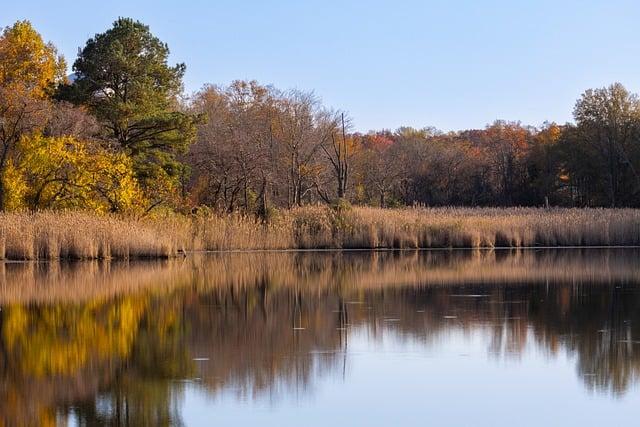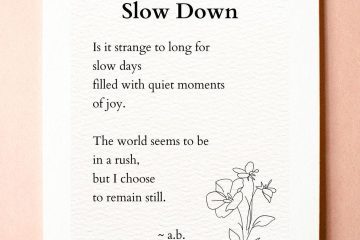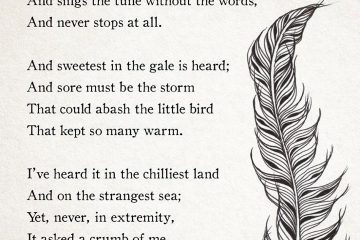Table of Contents
- Exploring the Essence of Unrealized Potential in Poetry
- Unleashing Creativity: Techniques to Tap into Untapped Ideas
- The Role of Reflection in Recognizing Poetic Possibilities
- Transforming Potential into Power: Steps to Revive Stagnant Verses
- Finding Your Voice: Overcoming Barriers to Poetic Expression
- Q&A
- In Summary


Exploring the Essence of Unrealized Potential in Poetry
Poetry often serves as a mirror reflecting the myriad layers of human experience, and within its verses lies the poignant theme of unrealized potential. This concept unfolds like a delicate flower, hinting at the aspirations and dreams that remain dormant within the soul. Through vivid imagery and nuanced emotion, poets encapsulate the struggles of growth, the fear of failure, and the yearning for transformation. Each stanza invites readers to explore their inner landscapes, where ambitions may flicker like distant stars, urging the heart to illuminate paths left unexplored.
In dissecting the nuances of unrealized potential, we encounter a multitude of voices that resonate with a shared vulnerability. The power of language becomes a vessel—carrying stories of longing and introspection. Whether it’s the lament of a poet grappling with self-doubt or the exuberance of one celebrating fleeting chances, these expressions foster a connection with the reader, allowing for a collective reflection on personal journeys. Each poem becomes a tapestry woven with threads of hope, disappointment, and the persistent winds of possibility that beckon us onward.
Consider the following aspects that emerge in poetry addressing unrealized potential:
| Element | Impact on Reader |
|---|---|
| Imagery | Creates vivid mental pictures of aspirations |
| Emotion | Evokes empathy for unfulfilled dreams |
| Symbolism | Represents the broader human experience |
| Metaphor | Illustrates complex ideas simply |
Through these literary devices, poets transform the intangible struggle of unrealized potential into something universally relatable. Each verse serves not just as a commentary on personal experiences but also as a catalyst for inspiration, inviting readers to confront their own dreams and the barriers that hinder them. In doing so, poetry becomes a powerful force, urging individuals to recognize that while paths may diverge, the potential for greatness lies ever-present, waiting to be awakened within each of us.


Unleashing Creativity: Techniques to Tap into Untapped Ideas
One of the most effective ways to unlock new ideas is by changing your environment. Stepping out of your usual setting can provide fresh perspectives and inspire innovative thoughts. Try these simple modifications:
- Connect with nature: A walk in the park or a day at the beach can rejuvenate your mind.
- Redesign your workspace: Rearranging furniture or adding plants can create a more stimulating atmosphere.
- Engage with different cultures: Visit art galleries, local markets, or cultural events that challenge your norm.
Another technique is to utilize brainstorming sessions effectively. Gather a group of diverse thinkers and encourage open sharing of ideas without judgment. This can lead to unexpected breakthroughs. Implement the following strategies during these sessions:
| Strategy | Purpose |
|---|---|
| Mind Mapping | Visually organize thoughts and ideas. |
| Word Association | Generate spontaneous ideas based on free association. |
| Role Play | Encourage thinking from multiple perspectives. |
Exploring creative constraints can also lead to innovative thinking. Set specific parameters for your work, such as limiting the materials you use or the themes you explore. This can spark ingenuity in unexpected ways. Embrace these limitations through practices like:
- Time Blocks: Challenge yourself to generate ideas within a strict time frame.
- Theme Limitation: Focus on a single theme to generate a series of related ideas.
- Resource Restriction: Limit the tools or mediums available to push your creativity.


The Role of Reflection in Recognizing Poetic Possibilities
Reflection serves as a vital mechanism through which poets can uncover the depths of their creativity, often leading to the exploration of ideas and emotions that might otherwise remain dormant. When a writer pauses to contemplate their feelings, experiences, and surroundings, they open the door to new thematic avenues. This internal dialogue can reveal the rich tapestry of human experience, allowing for greater depth in poetic expression. By engaging in this practice, poets can distill complex thoughts into poignant verses that resonate with readers.
Furthermore, reflection fosters an ability to re-examine previous works, enabling poets to recognize unrealized potential within their own writing. Often, lines that once seemed inconsequential might take on new significance upon revisiting. This process can help identify areas that require further exploration or rewriting, transforming fragments of thought into completed masterpieces. Through revision and reflection, poets breathe life into their work, pushing the boundaries of language and meaning.
Incorporating a structured approach to reflection can enhance a poet’s productivity. Below is a simple outline that illustrates key elements to consider during this process:
| Reflective Element | Purpose |
|---|---|
| Theme Exploration | Identifying core ideas to delve deeper into. |
| Language Choice | Evaluating word selection for clarity and impact. |
| Emotional Resonance | Assessing the emotional weight of the piece. |
| Imagery and Metaphor | Enhancing the visual and sensory elements. |
By implementing these elements, poets can transform their reflective practices into powerful tools for harnessing poetic possibilities, ultimately leading to a more profound connection with their audience.
Transforming Potential into Power: Steps to Revive Stagnant Verses
Every poet experiences moments where creativity feels like an elusive dream—a flicker of brilliance stifled by doubt or distraction. Restoring that creativity requires a deliberate approach. One effective method is to carve out dedicated time each day to engage with words, whether through free writing, journaling, or simply reading poetry from various genres. This practice not only nurtures your craft but also ignites the passion that may have faded. Aim for a consistent routine that encourages exploration and eliminates pressure. When the mind is free, inspiration often flows.
Another transformative step is surrounding yourself with stimulating environments. Consider engaging in collaborative workshops or joining writing groups, where constructive feedback and shared experiences can breathe new life into stagnant thoughts. Participating in fresh dialogues with fellow poets can spark new ideas and perspectives that you might have never contemplated. Furthermore, exposing yourself to art forms that diverge from poetry—like music, painting, or theater—can provide unexpected nuggets of insight that enrich your poetic voice.
intention-setting is crucial in reviving your verses. Define what you wish to achieve with your poetry, creating tangible goals that are both inspiring and realistic. For example, rather than aiming to write the perfect poem, start with the intention to generate a certain number of lines each week or to explore a specific theme. Below is a simple table to outline potential goals:
| Goal Type | Description |
|---|---|
| Daily Writing | Write for 15 minutes each morning. |
| Monthly Theme | Focus on a specific subject, like nature or grief. |
| Reading Challenge | Read 3 poems per week from different poets. |
By implementing these steps and dedicating time to revitalize your creative spirit, you’ll find that those dormant lines can emerge with newfound vigor and meaning.


Finding Your Voice: Overcoming Barriers to Poetic Expression
Finding your unique poetic voice can often feel like venturing into uncharted territory. Many writers grapple with self-doubt, fearing that their thoughts and feelings may not resonate with others. This internal struggle can lead to hesitation, preventing you from expressing your authentic self. To break through these barriers, reflection and exploration are essential. Consider journaling your raw emotions or experimenting with various poetic forms. This practice can help you discover what truly speaks to you and encourages the fluidity of your creative expression.
Understanding the reasons behind your hesitation is vital. Here are some common barriers and reflections to consider:
- Fear of Judgment: The worry of how others perceive your work can be paralyzing. Remember, poetry is personal and subjective.
- Perfectionism: Striving for perfection can hinder your creativity. Allow yourself to write freely, knowing that imperfections often lead to deeper insights.
- Lack of Inspiration: Sometimes, inspiration seems elusive. Engage with different art forms, nature, or literature to ignite your creative spark.
Connecting with other poets or joining writing groups can foster a sense of community, reinforcing that you’re not alone in your journey. Feedback from fellow writers can provide invaluable perspectives and encourage you to confront your fears. Additionally, embracing workshops or courses can expose you to new techniques and styles, helping you refine your voice. Remember that each poet’s journey is distinct, and overcoming barriers requires patience and resilience. Celebrate each small triumph, as they’re steps toward unveiling the potential within your poetic expression.
Q&A
Q&A on “Poem Unrealized Potential”
Q1: What does “unrealized potential” mean in the context of poetry?A1: “Unrealized potential” in poetry refers to the latent creative capabilities embedded within a poem that remain unexpressed or unexplored. It signifies the ideas, emotions, and themes that could have been developed further but were left on the page without full exploration or completion. This concept invites readers to ponder what the poem could have been had the poet chosen to dive deeper into its subject matter.Q2: How does a poem showcase its unrealized potential?A2: A poem might showcase unrealized potential through ambiguous language, unfinished thoughts, or abrupt endings. When a poem leaves certain themes unexplored or introduces captivating images that lack context, it creates a sense of yearning for more. This feeling can engage readers, urging them to fill in the gaps with their interpretations and contributions.
Q3: Can you provide an example of a poem that exemplifies unrealized potential?A3: Consider T.S. Eliot’s “The Love Song of J. Alfred Prufrock.” While it offers rich imagery and introspective thoughts, there’s an undercurrent of hesitation and uncertainty expressed by the speaker. The poem’s fragmented structure and the speaker’s reluctance to fully engage reveal a depth of longing and potential experiences that remain untapped, inviting readers to imagine the possibilities beyond the text.
Q4: Why is the concept of unrealized potential significant in poetry?A4: The significance lies in its ability to evoke a sense of longing and curiosity. It challenges readers to think critically about what lies beneath the surface and to question the boundaries of artistic expression. Moreover, it highlights the dynamic relationship between the writer’s intentions and the reader’s interpretations, making each interaction unique.
Q5: How can poets embrace unrealized potential in their writing?A5: Poets can embrace unrealized potential by allowing themselves to experiment with form, structure, and language, and by recognizing that not every idea needs to be fully fleshed out. They can explore themes deeply but also intentionally leave room for ambiguity and open-endedness, creating a space for readers to engage actively with the text and contribute their own thoughts.
Q6: What role does reader perspective play in the realization of potential within a poem?A6: Reader perspective is crucial because it shapes how the unrealized potential is interpreted and understood. Each reader brings their own experiences, emotions, and imagination to the poem, which can illuminate paths the poet might not have explicitly traversed. This interplay fosters a collaborative creativity where the poem evolves with each reading, ultimately fulfilling aspects of its potential through shared exploration.
Q7: How does understanding unrealized potential change our approach to reading poetry?A7: Recognizing unrealized potential encourages us to read poetry more actively. It prompts us to look beyond the words on the page and to engage with the unspoken meanings and emotions. This approach nurtures a deeper appreciation for the craft and opens up a dialogue between the poet and the reader, enriching the overall experience of poetry.—This Q&A serves to illuminate the intricate possibilities rooted in poetry, particularly through the lens of unrealized potential, enriching both the reading and writing experiences.




0 Comments